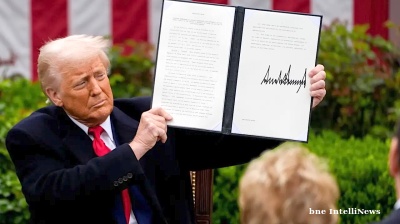Romania’s central bank, the National Bank of Romania (BNR), has revised slightly upwards the projected inflation trajectory for the two-year forecast period, now envisaging 7.5% inflation at the end of the year up from 7.1% previously.
The headline inflation will drop to 3.8% at the end of June 2025, according to the latest quarterly Inflation Report published by the BNR. The differences stem chiefly from the faster dynamics of the adjusted CORE2 index and, to a lower extent, from those of the VFE (vegetables, fruit and eggs) index, with the latter component depending almost entirely on weather conditions, which have recently become highly unpredictable.
The monetary authority, however, notes that the fiscal and budgetary policies pose risks that result in a wider uncertainty interval.
Since the previous Inflation Report, risks to the baseline scenario appear to have risen in number and, at the same time, to have diversified.
The assessed balance of risks suggests possible upward deviations of inflation from its path in the baseline scenario. While the developments attributed to the economic effects of the war in Ukraine, but also the more general, geopolitical ones, were reconfirmed as a major source of uncertainty, the risks associated with the future fiscal stance grew noticeably. Hence, the authorities are highly likely to take corrective measures with a direct impact on the annual inflation rate, the central bank reasons.
BNR governor Mugur Isarescu warned that markets will make the macroeconomic correction unless the government does it first.
Unless the government operates the fiscal correction requested by the European Commission and by the markets, the markets themselves will operate the correction instead and this will be more painful, Isarescu warned in the speech given along with the latest quarterly Inflation Report unveiled on August 9.
Isarescu also urged the government to eliminate the tax exemptions that result in tax evasion. When tax incentives are extended over a prolonged period of time, they end by turning into rents that distort the market and create problems in terms of solidarity and cohesion, he added.
“When you have so many tax exemptions, how can there be no evasion? They call it called tax optimisation, right? That's what they call it, tax optimisation, and it has been accepted for so many years,” he said, adding that it is the government’s job to simplify the tax system so that the tax collection agency can collect more revenues.
Speaking of the correction the markets may make, Isarescu explained that smaller forex inflows might result in a weaker domestic currency and the interest rates on the money market might increase even in the absence of monetary policy tightening.
“So it [all] depends on how the fiscal consolidation and correction will be done. We may witness, without moving the monetary policy rate, an increase in market interest rates, if we do not have the strength to operate a controlled correction and fiscal consolidation, using the tools we have at our disposal. And there are enough [tools] at our disposal," Isarescu said.
Speaking about the ongoing debate over the level of taxation, the BNR governor said that Romanians do not want a minimalist state and he argued that for the current level of budget revenues the state cannot provide public services at the required levels. He said that Romania cannot provide EU-style public and social services with the lowest tax rates in Europe.
News

European foreign ministers hit out at Georgian ruling party
Statement condemned ongoing democratic backsliding by the ruling Georgia Dream party, which has consolidated power via crackdowns on independent media, NGOs, activists and opposition politicians.
_1752493253.jpg)
RSF urges EU action over police violence against journalists in Serbia
Press freedom watchdog Reporters Without Borders warned abuses threaten the country’s EU accession process.

US and Panama launch joint military exercises amid canal security concerns
US helicopters have arrived in Panama to begin collaborative training exercises with local security forces, as tensions mount over the strategic waterway's future amid competing US and Chinese interests.

Migration pushes EU population to record high, but CEE countries continue to shrink
Immigration outweighed the natural population decline in 2024 in just three of the newer EU member states – Croatia, Czechia and Slovenia.



